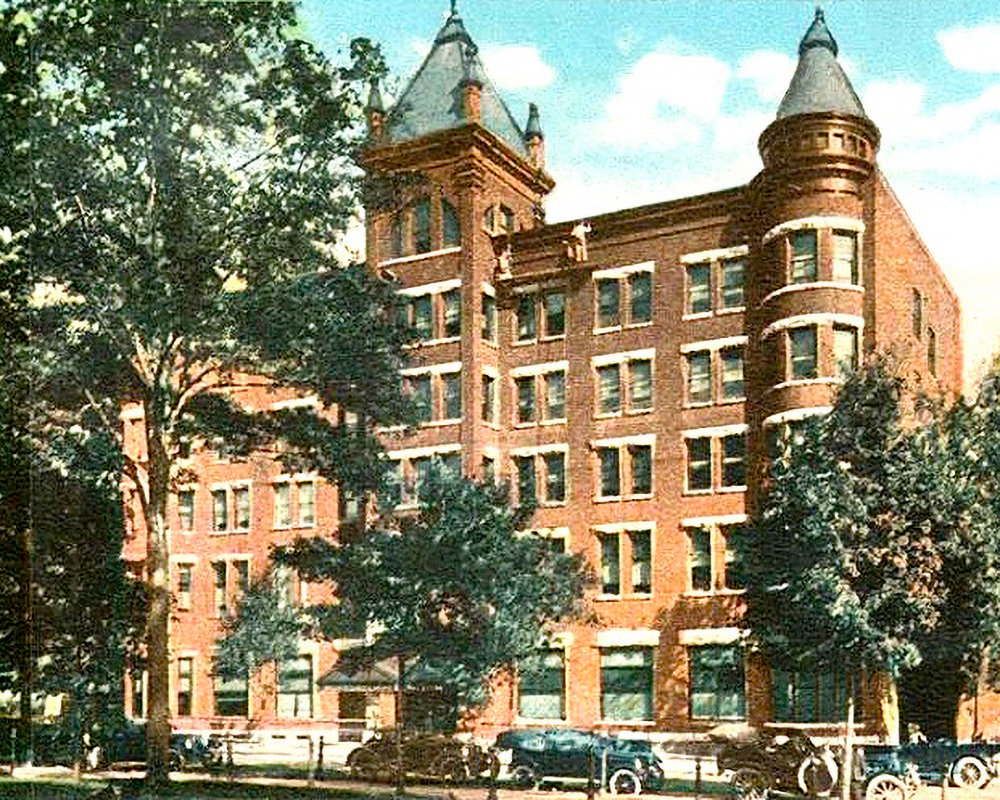
The grand Palatine Hotel hosted dignitaries from around the country.
By Mary McTamaney
Last week’s news included the announcement that all three of the old organizational headquarters buildings on Grand Street just north of Broadway – The American Legion, the YMCA and the Masonic Temple – have been sold by Orange County to the Foster Supply Hospitality Group from Sullivan County.
The three big brick buildings were constructed in the early twentieth century by strong and growing local institutions that expected to last another century into the future. While two of the three did last another hundred years, they did not remain in their spacious and well-equipped headquarters in downtown Newburgh. A combination of an aging, dwindling membership and the costs of maintaining large buildings and their infrastructure caused each of the big Grand Street clubhouses to close. The American Legion Post 152 sold its 1938 headquarters and started meeting inside the Town of Newburgh American Legion building. The YMCA closed its 1913 building and tried running without a campus, arranging programs in other facilities for a time and then closed its Newburgh office for good. The Newburgh Lodge of Masons held on the longest but they also sold their 1905 headquarters after trying to rent its space for a time. They moved to a new, much smaller building in New Windsor but finally folded.
When facilities like the Grand Street trio were actively hosting events in the early and mid-twentieth century, they attracted hundreds of people to their neighborhood for events like swimming and gymnastic competitions, dinners and dances, band concerts and elegant catered events in the Masonic Temple’s vast ballroom. Located just steps from Broadway, visitors to these facilities often participated or watched as eager spectators for the parades and ceremonies that filled Newburgh’s wide main street.
There was never any question that downtown venues would be busy every week since several theaters were just around the corner and restaurants dotted the commercial district. Companion organizations also filled in the neighborhood and hosted their own events too. The Elks Club around the corner on Liberty Street rarely had a vacant spot on its weekend calendar. Columbus Hall behind St. Patrick’s Church also had a big auditorium with a stage that was used often by community theater and others.
Where did overnight guests stay when attending all these Newburgh events? Downtown was dotted with many hotels large and small. Front Street held the biggest hotels in the days when so many people arrived by train, ferry and steamboat. Then, hospitality services started moving up the hill.
Egan’s Hotel, one of the first buildings in Newburgh designed for fire safety, occupied much of what is now the grass and evergreen tree lot across from the Motor Vehicle Department. The Palatine Hotel on Grand Street near Second Street was the poshest with 106 rooms. The Hotel Washington (now Hudson Point senior apartments) rose in the early 1930’s and the Hotel Newburgh (now Safe Harbors of the Hudson studio apartments) also opened in that decade. Among the big hotels were many smaller ones that each offered a handful of rooms with a bed-and- breakfast atmosphere to overnight visitors.
I looked back a century to the list of hotels in Newburgh in 1922. There were almost 30. Yet, Newburgh had fewer citizens then and a comparable demographic of working class folks. Who was using all these places? Families walked to those hotels for celebratory breakfasts and dinners in their little restaurants. Organizations like the lace workers union used their small meeting rooms. Countless business decisions were made in those hotel lobbies and parlors over coffee or tea.
Soon the sounds of construction will ring out along Grand Street as the three old headquarters that have been waiting for new purpose are gradually turned into a hotel complex. What services will it offer and who will be sipping coffee at its breakfast tables?